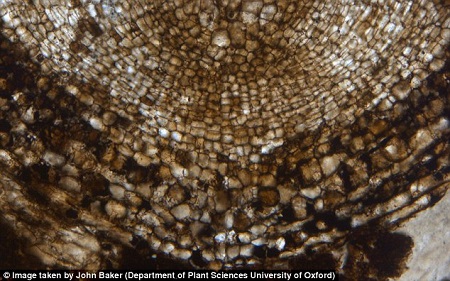It may look more like a shiny mosaic or a piece of jewellery, but a 320 million year old fossil contains the world’s oldest plant stem cells.
And it is giving us a completely new insight into the evolution of how plants grow.
The fossil shows that millions of years ago, the way plants grew from their roots was completely different to how any modern plants form.
Stem cells, self-renewing cells responsible for the formation of multicellular organisms, are found in plants at the tips of shoots and roots in groups called meristems.
Scientists have discovered the oldest known population of plant root stem cells in a 320 million-year-old fossil.
This means some of the mechanisms controlling root formation in plants and trees back then have now become extinct.
The fossils were the remains of the soil from the first giant tropical rainforests on Earth.
These fossils made up the rooting structures of the plants growing in the Earth’s first global tropical wetland forests.
The cells, which gave rise to the roots of an ancient plant, were found in a fossilised root tip a preserved selection of plants kept for scientists to study.
‘I was examining one of the fossilised soil slides as part of my research into the rooting systems of ancient trees when I noticed a structure that looked like the living root tips we see in plants today,’ said Alexander Hetherington, who made the discovery during the course of his research.
‘I began to realise that I was looking at a population of 320 million-year-old plant stem cells preserved as they were growing – and that it was the first time anything like this had ever been found.
‘It gives us a unique window into how roots developed hundreds of millions of years ago.’
The soil was preserved in rock that formed in the Carboniferous swamps which gave rise to the coal sources.
Because of this, Mr Hetherington has named the stem-cell fossil Radix carbonica, which is Latin for ‘coal root’.
The forests had trees over 164 feet (50 metres) tall, and were in part responsible for one of the most dramatic climate change events in history.
When deep rooting systems evolved, this increased the rate of chemical weathering of silicate minerals in rocks – a chemical reaction that pulled carbon dioxide out of the atmosphere.
This led to the cooling of the Earth and one of the planet’s great ice ages.
Professor Liam Dolan, senior author of the paper, said ‘these fossils demonstrate how the roots of these ancient plants grew for the first time.
‘It is startling that something so small could have had such a dramatic effect on the Earth’s climate.
Source: Daily mail
N.H.Kh

